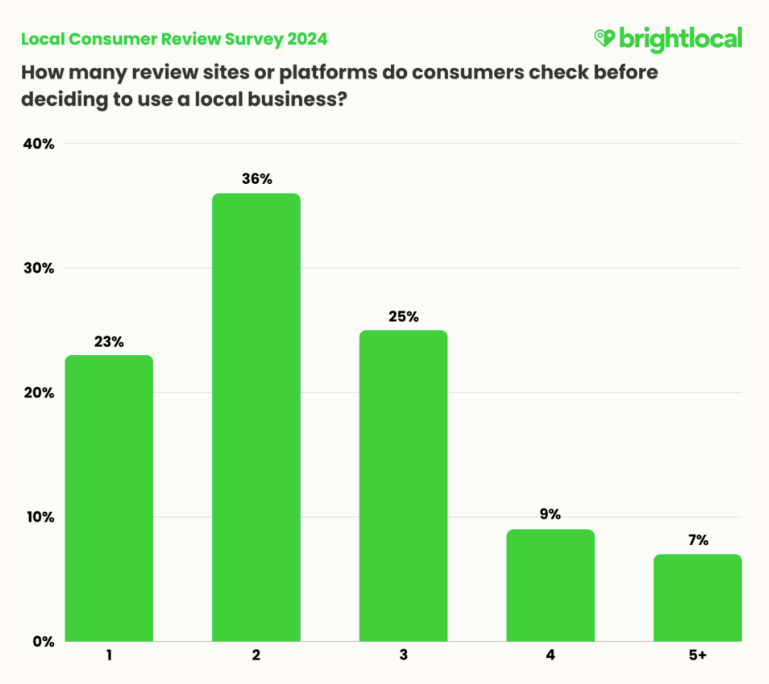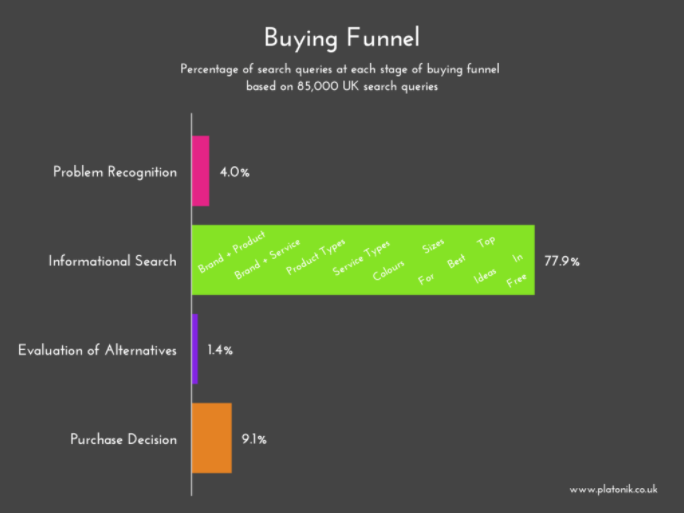Review Mix Grows, Google Spam Attack, Informational Vulnerability

Survey: 77% Look to Multiple Review Sites
BrightLocal's 2024 consumer reviews survey report contains numerous interesting findings, though I can only discuss a few of them here. Overall, a high percentage of consumers continue to trust reviews; yet people are diversifying their review sources. Google remains the dominant site (81%) but usage has fallen slightly. Consumers appear to be consulting a broader range of sites in addition to the "usual suspects" (Yelp, Tripadvisor, etc.). Those include local news sites, Instagram, YouTube, TikTok and Reddit among others. These respondents also say they're looking at more sites per conversion: 77% went to at least two review sites and 41% looked at three or more. This could be partly a function of the rise of review fraud. And more businesses appear to have active review solicitation programs. Nearly 70% of consumers remember being asked to leave a review. That's up vs. a year ago and so is the prevalence of review incentives (e.g., discounts), which are way up from two years ago (but against terms). Solicitation prompts (in email, in-person, SMS) appear to generate more positive than negative reviews. The survey also found consumers overwhelmingly want to see review responses (88%) and are more inclined to use a business that does so. But given the choice (blind "taste test") between an AI-generated response and one written by a human, the majority (58%) preferred the AI response.

Our take:
- Roughly 54% want to see a minimum of 4 stars. In selected verticals (per our research) it can be higher. This awareness has caused a jump in review solicitation and incentivized reviews, as well as fake reviews.
- One important finding for multi-location brands: "91% of consumers say local branch reviews impact their overall perceptions of big brands in some way."
- Caveat: there's a difference between attitudes and behavior. This shows up in the survey finding that 88% want to see review responses. Near Media behavioral research shows that 66% to 70%+ don't read review text at all.
Google: We'll Cut Spam by 40%
This week Google announced a number of algorithm and policy updates designed to address search quality. Partly, this is simply the next in a series of regular algorithm updates, but it's also a response to negative coverage and widespread exposure of search-quality issues. In addition, the company updated Quality Rater guidelines, which will probably have an indirect downstream impact on rankings. The updates appear to be more sweeping and significant than previous core updates. "Based on our evaluations, we expect that the combination of this update and our previous efforts will collectively reduce low-quality, unoriginal content in search results by 40%," Google said in a blog post. Specifically, the company is targeting "scaled content abuse," "site reputation abuse" and "expired domain abuse." Scaled content abuse is defined as mass-produced content seeking to manipulate rankings (programmatic SEO). Site reputation abuse is low-quality content from third parties published on "reputable sites" ("parasite SEO"). And expired domain abuse is the use of old (once reputable) domains for low quality content designed to generate clicks (see, e.g., Confessions of an AI Clickbait Kingpin). The "punitive" Helpful Content system is now part of the Core Update.

Our take:
- The industry generally regards these updates as "major" or "massive." Their impact will be felt over time. See also, Cyrus Shepard, Lilly Ray, Mike King.
- It may be challenging for Google to successfully execute some of these clean-up efforts. Google is also trying to get SEOs to comply with these changes so its algorithm doesn't have to do all the work.
- Google is going after content created primarily to rank in search results. Yet almost all commercial content is created at least in part for the purpose of ranking. Google has created the incentives and SEOs have responded.
Google's Informational Vulnerability
Search professionals tend to divide queries into three major buckets: informational, navigational, transactional. Navigational queries are "name in mind" searches. Transactional queries may be broader but carry purchase intent. And informational search captures everything else: all the general search behavior, random questions and pre-purchase information gathering. Local Search behavior cuts across all three. There's lots of discussion about whether and where Google might be vulnerable to AI disruption. So far not so much, although there are hints of it in the BrightLocal reviews study and in the Gen Z colloquialism "search it up" in place of "Google it." Yet Google's true vulnerability over time may exist in the realm of informational queries, which comprise the vast majority (70% to 80%) of search volume (see here, here). Right now AI results (including Gemini) are cleaner, simpler, more immediate (and sometimes more complete) than a traditional Google SERP. This is true in many categories of informational search: e.g., convert fresh garlic to dried, when is the best time to visit Hawaii, what are the top things to do in Seattle, who starred in XYZ movie, what is eustachian tube dysfunction, who won the Super Bowl in 1995? The advantage Google maintains is that AI results may be seen as less trustworthy.

Our take:
- The BrightLocal study found that 9% of people were using gen-AI for local business reviews. And multiple non-Google sites were also used. However, local is probably relatively safe from AI disruption for some time.
- My Google usage has probably dropped by 40% - 50% in favor of AI. As people use these sites/tools for other purposes, search is something they can also do without clicking over to Google.
- Search it up: Google's aggressive attention to its search quality issues reflects a broader understanding that its hold on consumers may be slipping.
Recent Analysis
- Google May Show Social Posts on GBP Profiles, by Mike Blumenthal.
- Why Local Searchers Look to the Local Finder, by Mike Blumenthal.
- Google Maps Blocked Reviews in Israel & Gaza, by Mike Blumenthal.
Short Takes
- Google testing GBP profile changes that bury reviews.
- Google to show social media content in Google Business Profile.
- Waze adds new features, updates but for how much longer?
- Mike King deck: Everything Google Lied to Us About.
- Using Google's "information satisfaction" as a way to think about SEO.
- Target launches its own version of Amazon Prime.
- StockX launches "immersive shopping experience" for the Apple Vision Pro.
- Apple rolls out iOS 17.4 to comply with DMA: browsers, new app stores, Siri.
- The TikTok ban is back on; new legislation would try to force divestiture.
- State AGs: Meta letting fraudsters, scammers, hackers run wild on platforms.
- Google's Gemini now lets you modify/edit prompts to refine results.
Listen to our latest podcast.

How can we make this better? Email us with suggestions and recommendations.

